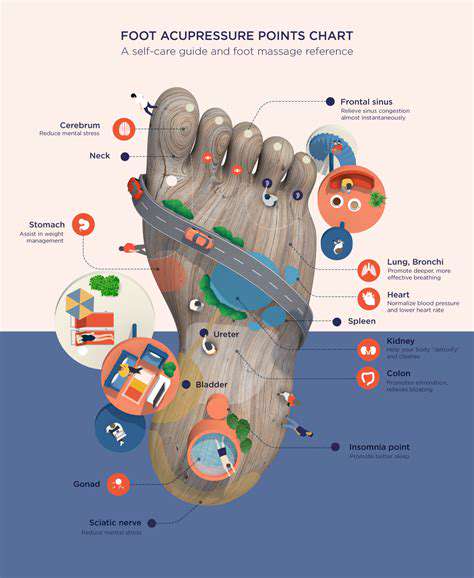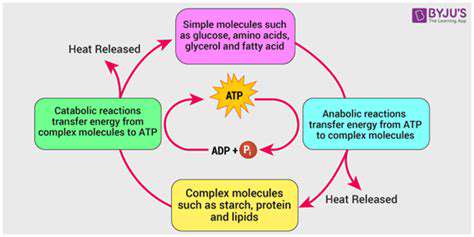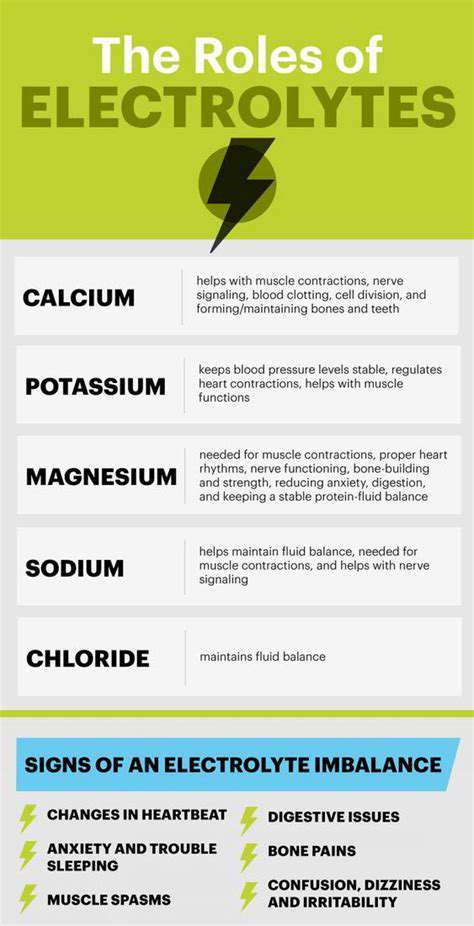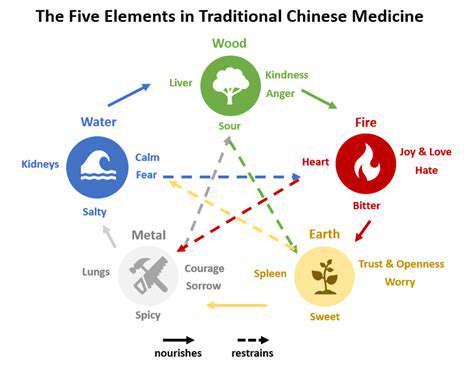Mindful Eating for Weight Management: A Gentle Approach
Understanding the Mind-Body Connection
Mindful eating isn't just about paying attention to your food; it's a powerful tool for understanding the intricate connection between your mind and body. By consciously engaging with the experience of eating, you can develop a deeper awareness of your physical cues, such as hunger and fullness. This awareness can help you differentiate between true physical hunger and emotional or stress-induced cravings, ultimately leading to healthier food choices and a more balanced relationship with food.
Recognizing these connections is crucial for long-term weight management. When you're truly aware of what your body needs, you're less likely to overeat or make impulsive food choices driven by emotions. This mindful approach fosters a more harmonious relationship with food, paving the way for sustainable weight management strategies.
Sensing Your Body's Signals
One of the key aspects of mindful eating is becoming attuned to your body's internal cues. This involves paying attention to the physical sensations of hunger and fullness. Rather than focusing solely on the visual appeal of food, or the pressure to finish everything on your plate, notice the subtle changes in your stomach, the feeling of your mouth watering, and the sensations in your digestive system as you eat.
Learning to recognize these signals helps you eat when you're truly hungry and stop when you're comfortably full. This awareness can significantly reduce overeating and promote healthier eating habits.
Slowing Down and Savoring
In our fast-paced lives, we often rush through meals, barely registering what we're consuming. Mindful eating encourages you to slow down and savor each bite. This involves appreciating the colors, textures, aromas, and flavors of your food. Take your time to chew thoroughly, noticing the different tastes and sensations as the food travels through your mouth.
Connecting with Your Food
Mindful eating promotes a deeper connection with the food you eat. Consider the source of your food, the journey it took to get to your plate, and the effort involved in growing or preparing it. This connection can foster a greater appreciation for the nourishment you're consuming and encourage healthier choices aligned with your values and priorities.
Identifying Emotional Eating Patterns
Mindful eating can illuminate emotional eating patterns. By paying close attention to your thoughts and feelings while eating, you can identify triggers and underlying emotional needs that might be driving your food choices. Recognizing these patterns, whether it's stress, boredom, or sadness, is the first step in developing strategies for healthier responses to these emotions.
Understanding these emotional connections can help you address the underlying causes of emotional eating and replace unhealthy coping mechanisms with more constructive ways of managing your emotions.
Cultivating Non-Judgmental Awareness
A crucial component of mindful eating is cultivating non-judgmental awareness. When you eat mindfully, you observe your thoughts and feelings about food without criticism. This means accepting your cravings, emotions, and even slip-ups without labeling them as good or bad. This non-judgmental approach allows for a more compassionate and understanding relationship with yourself and your body, ultimately fostering sustainable change.
Integrating Mindful Eating into Daily Life
Mindful eating isn't a rigid diet; it's a way of life. Integrating mindful eating principles into your daily routine can significantly enhance your overall well-being. Start with small steps, such as taking a moment to appreciate the aroma of your food before you begin eating or putting your utensils down between bites. These small changes can create a ripple effect, leading to more conscious and intentional food choices throughout the day.
Consistency is key to reaping the full benefits of mindful eating. By incorporating these practices into your daily life, you can cultivate a deeper understanding of your body's needs and create a more positive and sustainable relationship with food, paving the way for long-term weight management success.
Tuning into Your Body's Signals
Understanding Hunger Cues
Recognizing the subtle difference between physical hunger and emotional cravings is crucial for mindful eating. Physical hunger is a gradual sensation, often starting in the stomach or abdomen. It's a persistent feeling that intensifies with time. Learning to differentiate this from the often more intense and immediate sensation of emotional hunger, which might be driven by stress, boredom, or even sadness, is a key element in controlling your food intake and avoiding overeating.
Paying attention to the sensations in your body, such as an empty stomach, a rumbling sound, or a general feeling of emptiness, can help you identify when you're truly hungry. This awareness allows you to respond to your body's needs rather than reacting to external cues or emotional triggers.
Identifying Satiety Signals
Just as crucial as understanding hunger is recognizing when you're full. Satiety signals often manifest as a feeling of fullness in the stomach, a sense of satisfaction, and a decrease in the desire to eat more. Many people are so accustomed to eating until they feel overly full that they don't fully appreciate the nuanced sensation of comfortable fullness. This can lead to overeating and potential discomfort.
Mindful eating encourages you to listen to these signals. Instead of continuing to eat until you feel stuffed, stop when you feel comfortably full. Learning to differentiate between being full and being stuffed is a vital step towards healthy eating habits.
Mindful Eating Practices
Mindful eating involves a conscious and attentive approach to the act of eating. This includes paying attention to the colors, textures, aromas, and flavors of your food. It also involves slowing down your eating pace, putting away distractions like your phone or television, and truly savoring each bite.
This practice encourages a deeper connection with your body and food. By focusing on the sensory experience of eating, you become more aware of your body's signals, which can help you regulate your intake and make healthier choices.
The Role of Portion Control
Portion control is a vital aspect of mindful eating. It's about recognizing appropriate serving sizes based on your individual needs and activity level. Often, we eat more than we need, driven by habit or social cues. Mindful eating encourages you to assess portion sizes and consume only what your body truly requires.
Using smaller plates, measuring your food, and being mindful of serving sizes are all practical strategies to implement portion control effectively. This awareness helps you avoid overeating and maintain a healthy relationship with food.
Managing Emotional Eating
Emotional eating is a common issue that can significantly impact weight management. It's about using food to cope with stress, sadness, boredom, or other negative emotions. Understanding the emotional triggers behind your eating habits is essential for addressing this issue.
Mindful eating strategies can help you recognize these triggers and develop healthier coping mechanisms. This might involve practicing stress-reducing techniques like deep breathing or meditation, engaging in enjoyable activities, or seeking support from friends, family, or a therapist.
Connecting with Your Food
Mindful eating fosters a deeper connection with your food. By paying attention to the source of your food, its preparation, and its nutritional value, you can develop a greater appreciation for the nourishment it provides. This connection promotes mindful choices and encourages you to select whole, nutritious foods that support your overall well-being.
Understanding where your food comes from and how it's produced can lead to more sustainable and ethical food choices. This connection to your food extends beyond the immediate pleasure of eating and touches upon the broader impact of your choices on the environment and the people involved in the food system.
Simple Strategies for Incorporating Mindful Eating

Simple Strategies for Planning
Effective planning is crucial for success in any endeavor, from personal goals to large-scale projects. A well-defined plan provides a roadmap, guiding you through challenges and ensuring you stay on track. It allows you to anticipate potential obstacles and develop contingency plans. Planning also fosters a sense of control and reduces stress by providing a clear framework for action. This structured approach ensures that you allocate your resources effectively and maximize your chances of achieving your desired outcomes.
Developing a detailed plan involves breaking down your overall objectives into smaller, manageable tasks. This process allows you to prioritize tasks, estimate the time needed for each, and identify potential dependencies between them. By creating a visual representation of your plan, such as a timeline or a Gantt chart, you can easily track progress and make necessary adjustments along the way. Regular review and adjustments are essential for maintaining a dynamic and effective plan.
Incorporating Time Management Techniques
Time management is a critical aspect of any successful plan. Understanding how you spend your time is the first step towards optimizing your productivity. By analyzing your daily schedule and identifying time-consuming activities, you can identify areas where you can streamline your processes or delegate tasks. This process of self-assessment is crucial for maximizing your efficiency and achieving your goals within the allocated timeframe.
Various techniques, such as the Pomodoro Technique or time blocking, can significantly enhance your time management skills. These methods help you focus on one task at a time, preventing distractions and maximizing concentration. By implementing these techniques, you can improve your ability to manage multiple responsibilities effectively and meet deadlines with greater ease. Time management is a continuous process of learning and adapting to optimize your workflow and achieve your desired level of output.
Prioritizing Tasks and Managing Resources
Effective prioritization is essential for focusing your energy and resources on the most impactful tasks. Identifying tasks based on urgency and importance allows you to allocate your time and energy strategically, ensuring that critical activities receive the attention they deserve. This approach helps to avoid getting bogged down in less important or less urgent tasks, which can lead to wasted time and diminished productivity.
Proper resource management involves carefully evaluating the necessary resources for each task, including materials, equipment, and personnel. This includes anticipating potential resource constraints and developing alternative solutions to ensure that your projects stay on track. By effectively managing your resources, you can ensure that your projects are completed efficiently and effectively. This careful resource allocation is essential for minimizing potential delays and maximizing overall success.
Adapting to Change and Maintaining Flexibility
In today's dynamic world, the ability to adapt to change is crucial for success. A flexible approach to planning allows you to adjust your strategies and plans in response to unforeseen circumstances or new information. This adaptability fosters resilience and ensures that your plans remain relevant and effective in the face of evolving conditions. This proactive approach to change is essential for maintaining momentum and achieving your objectives.
Building flexibility into your plan involves identifying potential disruptions and developing contingency plans. This proactive approach ensures that you are prepared to navigate challenges and maintain progress. Remaining adaptable and flexible allows you to make informed decisions and stay ahead of the curve, even in rapidly changing environments. This resilience is key for success in any domain.











